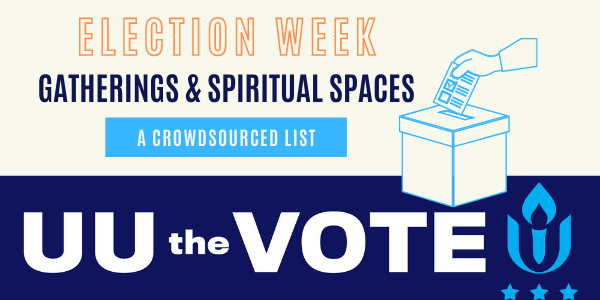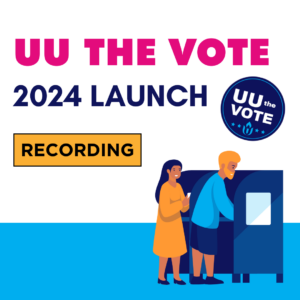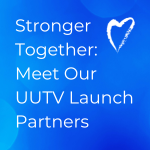Borderlands UU has been in partnership with local organizations to help provide basic humanitarian aid for migrants crossing the southern border of Arizona. Rev. Matthew Funke Crary speaks to their efforts in building deep relationships with these organizations in one of the most deadly border crossing regions in the country.
Content Warning: This article briefly discusses violence inflicted by the Border Patrol.
On August 12th, Rev. Matthew Funke Crary was overjoyed because he had just received word that his congregation, Borderlands Unitarian Universalist, had raised $4,000 to install an industrial washing machine and dryer. The celebratory mood was about something larger than the appliances themselves, however — it was for the milestone in their partnership with humanitarian aid groups in southern Arizona. These groups had asked Borderlands UU if they would be able to install the units in the church itself. Now, people providing direct humanitarian aid and people migrating through the region have the ability to wash their own clothes, bedding, and linens.
The washer dryer action is part of a broader effort by the congregation they call the Accompaniment Project. Named for what crossing migrants call the people who aid them — compañeros — the project is a vision that Borderlands UU began in the beginning of 2020, asking how they could better provide support to the local organizations that aid migrants in their journey to the United States.
Borderlands UU has worked in partnership over the years with the five organizations that are active in the area south of Tucson, Arizona. One of them, the Green Valley-Sahuarita Samaritans, members of the congregation helped to found. With these connections in place, the congregation asked how they could provide capacity where the organizations needed it.
“The kind of work [the organizations] do, whether it is making meals, doing desert searches and water drops, north or south of the line… it is almost normal — something that the congregation has internalized,” said Rev. Mathew. “We approached them and asked: if we walked together in order to walk with the migrants, what could you imagine? What might your needs be?,”
Their needs were as various as each organization is different.
The Tucson Samaritans often host university students and other groups of volunteers looking to join in the work on the southern border. Rev. Matthew began to imagine what it would be like if Borderlands UU bought 25 cots and offered their space, which includes a shower, at night for the volunteers.
No More Deaths, also known as No Más Muertes, is the largest and most well known humanitarian aid group in the region. Alongside People Helping People (PHP), they put in the request for the industrial washing machine and dryer.
When COVID-19 shut down most in-person gatherings, some of these projects were sidelined. Borderlands UU was still able to help because of their large building; when the Green Valley-Sahuarita Samaritans needed a place to meet, Borderlands offered their large outdoor veranda that satisfies social-distancing measures.
Rev. Matthew is aware of the gift that his congregation has in their location, and wants to be intentional about using it to aid the greater community. This includes the community of people who are passing through: the migrants.
Borderlands UU is situated almost exactly halfway between Tucson, Arizona and the border town of Nogales, Mexico. They lie in what is called the “Tucson Sector”, where in 2017-18 a quarter of known deaths occurred while crossing. This is largely thanks to increased presence and militarization of the border patrol, which forces migrants to skirt urban areas and risk the extreme heat of the desert. Before 2000, fewer than five bodies were found in the Tucson sector each year. Now the number is well over 100 every year.
Borderlands UU lies in what is called the “Tucson Sector”, where in 2017-18 a quarter of known deaths occurred while crossing. This is largely thanks to increased presence and militarization of the border patrol, which forces migrants to skirt urban areas and risk the extreme heat of the desert.
Migrants will occasionally show up at Borderlands UU seeking aid. Usually they just want to charge their cell phone and keep moving. But the congregation makes sure to keep supplies ready to go, so they can provide uncontaminated water and snacks if needed.
Nothing is certain, but one reason that Rev. Matthew believes they choose to go to Borderlands UU for help is the signs they keep in front of the church. Written in Spanish and English, they indicate “Humanitarian Aid Is Never a Crime”, with pictures of water jugs. Sometimes this is all it takes for strangers to sense that the congregation is a safer place.
Border patrol and ICE are actively cracking down on humanitarian aid and recently have been harassing the Byrd Camp, a humanitarian aid outpost run by No More Deaths. In the morning of July 31st, they had detained a migrant woman while she was in the shower. After that event, the organization asked clergy to come and be a presence at the camp. Rev. Matthew, alongside Rev. Bethany Russell-Lowe of UU Tucson and a host of pastors from different faiths, stood in the 107 degree heat.
Then they left to go home, and Border Patrol raided the camp. They arrived with an armored vehicle, two helicopters, and over 20 other vehicles. They arrested the migrants on site and confiscated everyone’s phones. They destroyed files, slashed tents, and dumped life-saving clean water. The UUSC condemned the raid as a “retaliatory campaign driven by xenophobia and racism”.
In the anger, the sadness, and the fear that followed the raid, Borderlands UU did not forget to keep walking with the groups. They rekindled the washer dryer project, and finished raising the money to install them into the church.
“A washer and dryer are so small in comparison to a camp being raided, people’s lives turned upside down,” said Rev. Matthew. “It is small but it also says that we have this relationship. It implies a future where No More Deaths is going to need to do many, many loads of laundry. It is an investment in walking a little further together towards that future.”
“A washer and dryer are so small in comparison to a camp being raided, people’s lives turned upside down,” said Rev. Matthew, “… but it implies a future where No More Deaths is going to need to do many, many loads of laundry.”
Today, there is even more to fear than the desert and Border Patrol. But Rev. Matthew notes that amid all of this fear, the work that UU’s are doing across the country gives him hope.
“It is important to feel fear, and to hear it, but not to be controlled by it. I believe that what UU the Vote shows is that in the face of that fear, we are doing the work together to share in our common humanity.”
The Accompaniment Project invites your help to continue the work towards its shared goal in end suffering and death in the desert borderlands. Visit their fundraising page here to learn more.
Written by Aidan Wertz, UU the Vote blogger. Aidan is a college student in Middlebury, Vermont and a lifelong UU.





